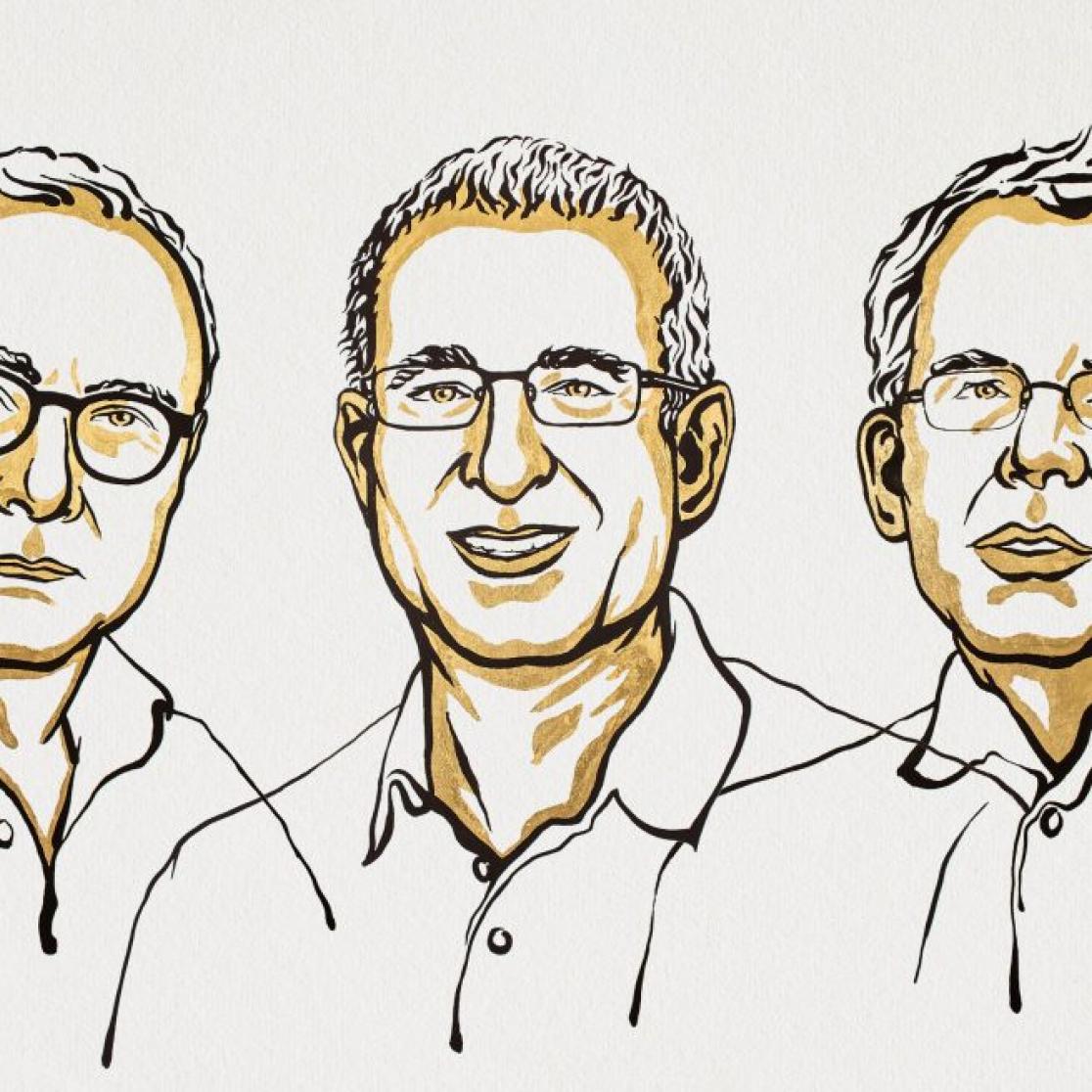SBE academics react to 2021 Nobel Prize in Economic Sciences
(Dit artikel is alleen beschikbaar in het Engels)
On 11 October, The Royal Swedish Academy of Sciences decided to award the 2021 Sveriges Riksbank Prize in Economic Sciences in Memory of Alfred Nobel with one half to David Card “for his empirical contributions to labour economics” and the other half jointly to Joshua D. Angrist and Guido W. Imbens “for their methodological contributions to the analysis of causal relationships.”
News of this years' prize was received with a lot of excitement at the School of Business and Economics. Many of our experts across multiple departments have stated that the work of this years' laureates has been incredibly influential in teaching and economics in general. In this article, SBE's academic experts share their thoughts on the 2021 Nobel Prize in Economic Sciences.

Jermain Kaminski
Assistant Professor Organisation,Strategy & Entrepreneurship
'Many standard regression or machine learning approaches these days remain rather correlational and unaware of confounding, which makes them often unsuitable for solving a wide range of decision problems, and, in some cases, even result in disparate treatment of individuals. This year's award recognizes the work of scientists who have long worked on methodological solutions to problems encountered in today's widely applied data-driven methods and their limitations. Judea Pearl, who won the Turing Award in 2011 for similar work on causal graphs in the computer sciences, would interpret this shift from correlative to causal inference as a shift from "seeing" to “doing”, describing the possibility to make interventions in observational data. Viewing this as an important contribution to the future of AI, I see this year’s decision with great excitement.'
'This year's award is in recognition of empirical researchers who have advanced the field of identifying causal relationships. What we are currently observing in this context is that both economists and computer scientists are increasingly engaged in the topic of causality, which is encouraged by the relative ease with which experimental studies can be conducted on a large scale. Thus, their contribution is not only valuable to economics but carries over to the concept of causal machine learning in the near future.'
'We are very honored to host Professor Guido Imbens from Stanford University and Sara Magliacane from the University of Amsterdam & MIT IBM Watson Lab at this year’s Causal Data Science Meeting 2021 online on November 15-16. The meeting is jointly organized by Maastricht University and Copenhagen Business School (CBS). More information will follow soon, but we are excited about this great opportunity and will invite interested students to join us.'

Steffen Künn
Assistant Professor of Macro, International & Labour Economics, School of Business and Economics
'The work of the laureates is a daily business at our department.'
'Each of my publications cites the work of at least one of the three Nobel laureates. The development of their methods and the countless applications of such methods shaped the economics profession and policy-making during the last decades. The methods are now standard curriculum in applied economics classes. And because of the applications, we nowadays have a better understanding of the functioning of our economic systems as well as other domains of society. In my view, this is the main achievement of this year’s Nobel laureates, and the award is very well deserved.'
'The laureates’ work is well integrated into the economics education at SBE. Already at the BSc level, students are introduced to causal identification and the role of natural experiments in courses such as Labour Economics, Economics, and Sociology or a newly introduced course starting next academic year, Society Through the Lens of Economists. In our view, it is key for students to gain the early insight that causal inference is needed to draw reliable conclusions on economic relationships. At the master level, students obtain a more in-depth understanding of the methods allowing causal inference and also learn to apply them when analysing real-life problems. Looking at the economics curriculum at SBE (and many other universities), I think it is fair to say that Card, Angrist, and Imbens brought economics education closer to reality, helping to solve pressing societal issues.'

Stephan Smeekes
Associate Professor at QE Econometrics, Quantitative Economics
'Angrist and Imbens have done a lot to develop this way of establishing causality. Their contributions have been twofold:
- First, they have led the way in showing economists how to find such natural experiments and have developed methods on how to analyse them.
- Second, they, and Imbens in particular, have developed and popularized a formal framework to think about causality.
The framework they developed, and its application to popular settings of natural experiments and estimation methods, have made it much clearer what a ‘causal relation’ actually means in which context, and perhaps even more importantly, what it doesn’t mean. '
'It is fair to say that nowadays in empirical economics, certainly when data over a (large) number of people or firms are considered, the framework of natural experiments and the accompanying methods to analyse them, have become the de facto standard way of establishing causal relations in many branches of economics and beyond. The work of the Noble Prize winners has therefore been of tremendous importance.'

Didier Fouarge
Professor of Economics, Director of the Research Centre for Education and the Labour Market (ROA)
'My colleague Raymond walked into my office to warn me. Labour is not a very large theme in economics when you compare it to finance for example. It is good to hear that our field of research gets such important recognition.'
'I do not know the laureates personally, but surely: all of us know about their work! Card’s contributions to labour economics and in particular the impact of migration on wage, and the minimum wage on the labour supply are famous. We even used one of Card’s papers for an assignment during the Ph.D. recruitment process at ROA this summer. Angrist not only contributes to labour economics but also adds to the field of economics of education with his research on returns to education. Together with Imbens, he developed a full body of work to help us assess the impact of policy reforms.'
'For informed policy choices, it is important to find out what causes what. Their body of work provides us with tools that allow us to infer the causal effects of policies. Sometimes, it is possible to design experimental settings to test for the effect of new policies. In 2019 Abhijit Banerjee, Esther Duflo, and Michael Kremer got the prize for such endeavour in development economics. However, such experimental settings are not always possible. If you want to know what the wage returns are to obtaining an MSc degree from a university rather than a BSc degree from a university of applied science, for example, you cannot simply compare the wages from the two groups because they differ in many ways. You also cannot randomly select who will and who will not obtain an MSc title and then compare the wages. But the work by Card, Angrist, and Imbens help us with methods that we could use for such evaluations.'

Pascal Heß
Ph.D. candidate at the Research Center for Education and the Labour Market (ROA)
'I was well aware that this year’s Nobel Prize went to 3 extraordinary researchers from the field of causality research. They all deserve the prize for their pioneering work. Especially David Card was among the earliest trying to estimate a - what we now call - causal relationship. Joshua Angrist and Guido Imbens are extremely talented in explaining complicated matters in a way ordinary researchers would understand. When I first heard about the winners, I was enthusiastic that the field I am researching in now gets recognized in public.'
'All of them are well-deserved winners of this years’ Nobel Prize. The impact of winning the prize is as always: The general public will get a short insight of what we are doing. I often hear people asking what I research on as a labor economist. Now I can take David Card’s Minimum Wage Study to explain what we are working on. However, I think the impact of Joshua Angrist and Guido Imbens on their field will be much higher. The new literature on machine learning and causality has a bright future in my opinion because it can be set up interdisciplinary and thus addresses much more researchers than e.g. labor economics.'
'I think everyone who is somehow related to labor or economics in general has read a paper by David Card, Joshua Angrist, or Guido Imbens. If you are browsing papers on a topic like education, labor, or econometrics, you are very likely to find a paper co-authored by David Card. He is a trendsetter. It is sometimes hard to follow the math if you are not talented to do so, but his papers are always worth understanding. This brings me to Joshua Angrist and Guido Imbens. Their books, both helped thousands of other researchers in different disciplines to understand what is important in empirical research when you want to claim causality. Reading a paper by them is like reading a book simultaneously in two languages: math and English. If you don’t understand the math, you will understand it from the text, and vice versa. The potential outcomes framework especially Guido Imbens promoted in his book with Donald Rubin is a standard way of thinking about causality today. Without them (and many other talented researchers not mentioned here) we would still have a long way to go to something like evidence-based politics.'

Lees ook
-
Drie Vidi-beurzen voor FHML-onderzoekers
Aurélie Carlier, Bart Spronck en Nicole Leibold ontvangen een Vidi-beurs van maximaal 850.000 euro om hun onderzoekslijnen verder te intwikkelen.

-
''Nu het buitenland de verkiezingen binnenkomt, moet het over de Europese Unie gaan''
Volgens velen draaien verkiezingen normaal gesproken om binnenlands beleid – om banen, zorg en belastingen. Buitenlands beleid zou iets zijn voor elites en diplomaten, niet voor de kiezer. Maar volgens Joris Melman, onderzoeker bij Studio Europa Maastricht, moet dat gaan veranderen. In een...

-
